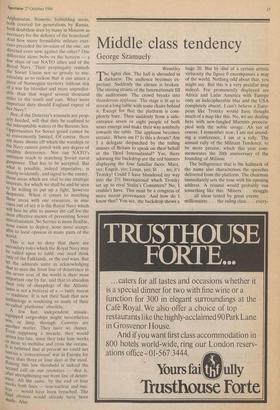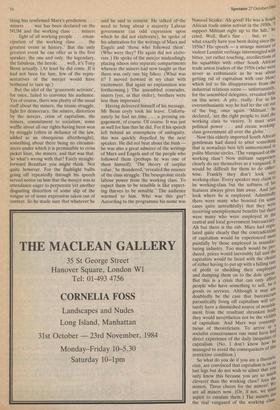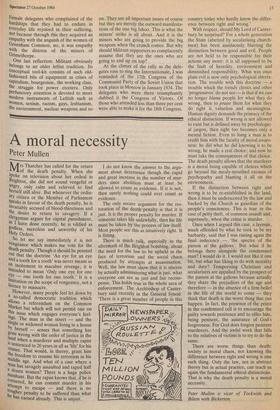Middle class tendency
George Szamuely
Wembley The lights dim. The hall is shrouded in darkness. The audience becomes ex- pectant. Suddenly the silence is broken. The stirring strains of the Internationale fill the auditorium. The crowd breaks into thunderous applause. The stage is lit up to reveal a long table with some chairs behind it. Except for that the platform is com- pletely bare. Then suddenly from a side- entrance seven or eight people of both sexes emerge and make their way sombrely towards the table. The applause becomes ecstatic. Where am I? Is this a dream? Am I a delegate despatched by the toiling masses of Britain to speak on their behalf at the Third International? Yes, there adorning the backdrop are the red banners displaying the four familiar faces: Marx, yes; Engels, yes; Lenin, yes; St . . . no, it's Trotsky! Could I have blundered, my way into the 21/2 International which Trotsky set up to rival Stalin's Comintern? No, I couldn't have. This must be a congress of more recent provenance. And how do I know that? You see, the backdrop shows a huge 20. But by dint of a certain artistic virtuosity the figure 0 encompasses a map of the world. Nothing odd about that, you might say. But this is a very peculiar map indeed. For prominently displayed are Africa and Latin America with Europe only an indecipherable blur and the USA completely absent. I can't believe a Euro- pean like Trotsky would have thought much of a map like this. No, we are dealing here with new-fangled Marxists preoccu- pied with the noble savage. Ah yes of course, I remember now, I am not attend- ing a conference, I am at a rally. The annual rally of the Militant Tendency, to be more precise, which this year com- memorates the 20th anniversary of the founding of Militant.
The belligerence that is the hallmark of the name also characterises the speeches delivered from the platform. The chairman immediately sets the tone with his opening address. A résumé would probably run something like this: 'Miners . . . struggle . . . all ideas tested by great events . . . millionaires . . . the ruling class . . . every-
thing has confirmed Marx's prediction . . . miners . . . war has been declared on the NUM and the working class . . . miners . . . fight of all working people . . . eman- cipation of the working class . . . the greatest event in history.' But the only greatest event he can offer us is the first speaker, the one and only, the legendary, the fabulous, the heroic . . . well, it's Tony Benn actually. (At least he did come. If it had not been for him, few of the repre- sentatives of the meejer would have bothered to turn up.) But the idol of the `grassroots activists', for once, failed to convince his audience. Yes of course, there was plenty of the usual stuff about the miners, the titanic struggle, fight for democracy, the miners, distortion by the meejer, crisis of capitalism, the miners, commitment to socialism, some waffle about all our rights having been won by struggle (often in defiance of the law, added as an obsequious afterthought), something about there being no circumst- ances under which it is permissible to cross picket lines, the miners, and that was that. So what's wrong with that? Fairly straight- forward Bennfare you might think. Not quite however. For the flashlight bulbs going off repeatedly through his speech served notice on him that the meejer was in attendance eager to perpetrate yet another disgusting distortion of some slip of the tongue or of some expression taken out of context. So he made sure that whatever he said he said in context. He talked of- the need to bring about a majority Labour government (an odd expression upon which he did not elaborate), he spoke of his admiration for the writings of Marx and Engels and 'those who followed them'. (Who were they? He again did not elabo- rate.) He spoke of the meejer misleadingly placing ishoos into separate compartments whereas the miners had now taught us that there was only one big Ishoo. (What was it? I moved forward in my chair with excitement. But again no explanation was forthcoming.) The assembled comrades, sisters (yes, in that order), brothers were less than impressed.
Having delivered himself of his message, Mr Benn coyly took his leave. Unfortu- nately he had no time . . . a pressing en- gagement, of course. Of course. It was just as well for him that he did. For if his speech left behind an atmosphere of ambiguity, this was quickly dispelled by the next speaker. He did not beat about the bush he was also a great admirer of the writings of Marx and Engels and of the people who followed them (perhaps he was one of them himself). `The theory of surplus value,' he thundered, `revealed the essence of the class struggle. The bourgeoisie steals labour power from the working class. To expect them to be sensible is like expect- ing thieves to be sensible.' The audience warmed to him. Who was this guy? According to the programme his name was
Nimrod Sejake. Ah good! He was a South African trade union activist in the 1950s. `I support Militant right up to the hilt,' he cried. Well, that's fine . . . but, er . • • what exactly have you been doing since the 1950s? His speech — a strange mixture of violent Leninist verbiage intermingled with bitter, yet rather touching, recollections of his squabbles with other South African trade union leaders of the 1950s (who were never as enthusiastic as he was about getting rid of capitalism with one blow) which led to his disappearance from the industrial relations scene — unfortunately, for the assembled delegates, revealed little on this score. A pity, really. For in his overenthusiastic way he had let the cat out of the bag, once again. 'Militant,' he declared, 'are the right people to lead the working class to victory. It must seize political power . . . and create working' class government all over the globe.' Now this elderly imported South African gentleman had dared to utter something that is nowadays best left unmentioned in polite Marxist circles. 'The vanguard of the working class'! Now militant supporters clearly do see themselves as a vanguard. It would be difficult for them to do other' wise. Frankly they don't look veil working-class. Every speaker may claim to be working-class but the softness of his features always gives him away. And just look where he is employed: Admittedly there were many who boasted (in some cases quite untruthfully) that they were receiving unemployment benefits but there were many who were employed in the central and local government bureaucracy' Ah but there is the rub. Marx had stipu- lated quite clearly that the contradictions of capitalism would be experienced most painfully by those employed in manufac- turing industry. Too much would be pro' duced, prices would inevitably fall and the capitalists would be faced with the choice of either having to put up with a falling rate of profit or shedding their employees and dumping them on to the dole queue' But this is a crisis that can only affect people who have something to sell, be it goods or services. Although it may tin. doubtedly be' the case that bureaucrats parasitically living off capitalism will cer- tainly have a diminished source of nourish' ment from the resultant shrunken body they would nevertheless not be the victims of capitalism. And Marx was contemp- tuous of theoreticians. To arrive at a, socialist consciousness one must have 10, direct experience of the daily inequities c't capitalism. (No, I don't know how 11.e managed to avoid the consequences of this restrictive condition.) So what do you do if you are a theorerl cian, are convinced that capitalism is on its last legs but do not wish to admit that you only know this because you are so much cleverer than the working class? Join the miners. Three cheers for the miners! We are all miners now. (Or, if not, we must aspire to emulate them.) The miners are the real vanguard of the working class'
Female delegates who complained of the hardships that they had to endure in everyday life rejoiced in their suffering, not because through this they acquired an empathy with the anguish of the women of Greenham Common, no, it was empathy with the distress of the miners of Grimethorpe. One last reflection: Militant obviously belongs to an older leftist tradition. Its conceptual tool-kit consists of such old- fashioned bits of equipment as crises of capitalism, bourgeoisie, the working class, the struggle for power etcetera. Only perfunctory attention is devoted to more modern instruments of Leftish such as Women, sexism, racism, gays, lesbianism, the environment, nuclear weapons and so • on. They are all important issues of course but they are merely the outward manifesta- tions of the one big Ishoo. This is what the miners' strike is all about. And it is the miners who are going to provide the big weapons when the crunch comes. But why should Militant supporters so complacently assume that they are the ones who are going to end up on top?
At the climax of the rally as the dele- gates rose to sing the Internationale, I was reminded of the 17th Congress of the Communist Party of the Soviet Union that took place in Moscow in January 1934. The delegates who were there triumphantly dubbed it the Congress of Victors. Of those who attended less than three per cent were able to make it for the 18th Congress.




















































 Previous page
Previous page